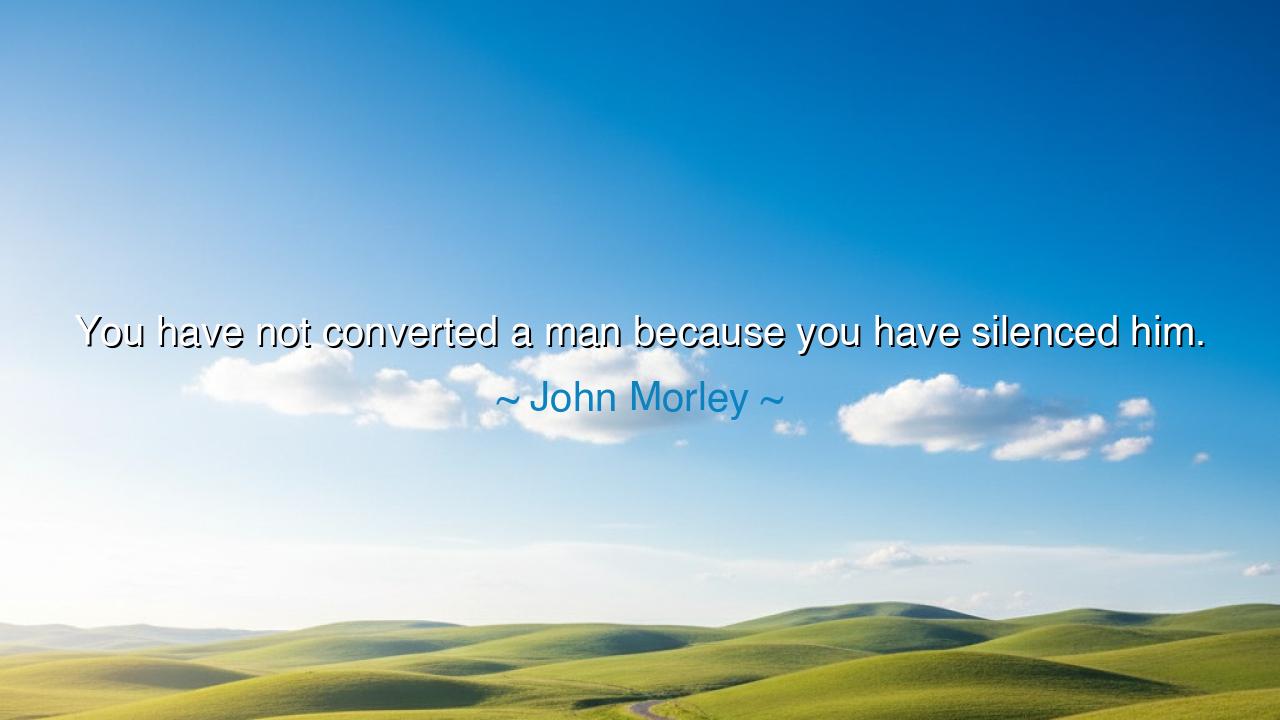
You have not converted a man because you have silenced him.






The words of John Morley — “You have not converted a man because you have silenced him.” — carry the weight of both philosophy and warning. Morley, the English statesman and biographer of great thinkers, understood that true victory lies not in crushing opposition but in changing hearts. To silence a man is to still his tongue, but not his mind; the flame of dissent, though hidden, still burns. True conversion requires persuasion, reason, and truth — never force alone.
The meaning is clear: domination is not transformation. When a ruler, priest, or teacher silences another, he achieves only the illusion of peace, not the reality of conviction. The silenced man may bow outwardly, but within he remains unconvinced, waiting for the day when his voice may rise again. Morley’s words warn us that enduring harmony is built not on the ashes of suppressed voices, but on the fertile soil of persuasion and mutual understanding.
History reveals this lesson in sharp relief. Consider the Spanish Inquisition, which sought to impose religious conformity through terror and punishment. Many were silenced, their words forced back into their throats by fear of fire. Yet their hearts were not changed, and in secret their beliefs endured. Centuries later, freedom of conscience triumphed, proving Morley’s wisdom: that silence is no substitute for conversion, and fear cannot replace faith.
Even in modern times, this truth resounds. During the era of civil rights in America, authorities tried to silence voices like Martin Luther King Jr. through arrests, threats, and violence. Yet silencing only strengthened the cause, for hearts were not swayed by force but awakened by truth. King’s words moved not by coercion but by moral power, showing that genuine conversion is born in the soul, not imposed by chains.
Let this wisdom endure for generations: to silence is easy, but to persuade is divine. The true art of leadership, of teaching, of living, is not to force mouths closed but to open minds. John Morley’s voice cries across time — seek not the hollow victory of silence, but the eternal triumph of truth. For only when hearts are changed can peace be real, and only when voices are free can justice endure.






VNVy Nguyen
John Morley’s quote really challenges how we approach conflict and disagreement. Silence isn’t the same as agreement—it’s just a lack of response. Does silencing someone really make them see things your way, or does it simply deepen their conviction? This makes me think: when we disagree with someone, how can we foster real change, not through forceful silence but by engaging in constructive and respectful dialogue?
BTBich Thao
This quote reminds me of the importance of true conversation and the difference between silencing someone and actually convincing them of a new idea. I wonder how often we, as a society, think we’ve solved a disagreement simply because we’ve shut someone down. How do we ensure that we’re truly engaging in respectful dialogue, instead of just winning arguments through silencing others?
MTMinh Tung
I agree with this quote, and it really resonates with current political and social climates. Silencing people, especially in debates, doesn’t actually change their perspective—it just suppresses their ability to express it. If we silence opposing views, how can we foster real change? How do we encourage people to listen to each other, rather than just silence them when their views are uncomfortable or challenging?
MTLe Minh tien
This quote makes me think about how we often confuse silencing with convincing. Just because someone stops speaking doesn't mean they've been convinced. I think it highlights a dangerous aspect of debate and discussion—people may stop arguing, but that doesn’t mean they’ve changed their views. How often do we mistake silence for agreement? What’s the real value of dialogue if it doesn’t allow for genuine exchange of ideas?